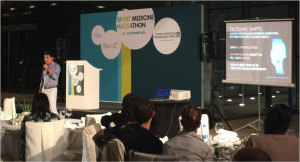By sports physiotherapist @NicolvanDyk (Qatar)
Let’s face it, technology is drastically changing the world of medicine. Electronic records have revolutionised entire health care systems, robotics redefined precision and apps now assist the diagnostic process. To give patients the best care possible, it’s important not to be left out in the (technological) cold: we need to adapt and innovate. However, advances in medical technology take time, money, effort and years of development, testing (more testing) and approvals. Is there a faster way around this?
As part of the Global Entrepreneurship Week, the Qatar Sports and Technology Park (QSTP) held the first Sports Medicine Hackathon in Doha, Qatar. If you are trying to figure out which athletic disciplines form part of a hackathon, stop. It’s not that kind of –thon. A hackathon (“hack” referring to explorative programming and “marathon” meaning to lasting a while) brings people from different fields and backgrounds—clinicians, engineers, coders, entrepreneurs, software developers and designers—together in one place. Invited speakers pitch current problems in the field (in this case sports-medicine) and teams pick the problem they are most interested in and spend the two days designing the software and/or hardware to solve it. The competitive nature of the hackathon adds to the brainstorming and initiative, although lots of cross pollination is allowed between groups. On the second and final day, in a two minute pitch, the group presents their idea to the judges. Prizes are awarded to the most innovative, impactful, and implementable solutions. There are countless networking opportunities and there is the occasion to turn the idea into a viable business at the end of the weekend.
Is this the future of medical innovation?
Some startups have been developed (and been successful) at these events. Pillpack for instance helps patients manage their medication usage. RubiconMD is a hackathon brainchild which streamlines referrals to specialists. A simple tool like Smartscheduling reduces no shows, and could save the health care industry up to $150 billion annually. At the Medstart 2-day hackathon hosted by Tufts School of Medicine, a group developed an app based eye movement tracker, which could serve as a reliable on-field concussion test. These are the gamechangers we need. Yes, we agree that some vigorous science now needs to take place. To have a real impact on sports medicine, the next step would be to realise the idea and let science run its course: set up a hypothesis, randomized control trials, or some verification that allows us to trust the innovation. In order for us to move away from archaic traditional methods of problem solving, we need to leverage our modern day advantage of being able to pool resources. As @ChrisLee reminded us during the QSTP Hackathon “fail fast and change quickly.”
Hackathon’s are springing up everywhere.
The Hackathon phenomenon has grown more and more popular, and is gaining momentum through MIT Hack Medicine (@MITHACKMED), who nurtures these events, holding hackathons on a global scale. An industry problem solved by a supercloud of brainstorming by people with different skill sets. This is what a hackathon represents. Perhaps it is the “blue sky” idea which has made these events so popular. It’s a Steve-Jobs-Richard-Branson like idealogy of letting your mind to explore freely and find ideas that shift the current paradigm. And yes, a bunch of nerds wearing hoodies and drinking coffee all day might not sound appealing right away (except of course if you are one of those people), but it might be exactly what we need. Sports Medicine Hackathon’s could be the perfect platform for accelerated knowledge integration, shared problem solving and ultimately, innovation. Medicine, get ready to be hacked.
